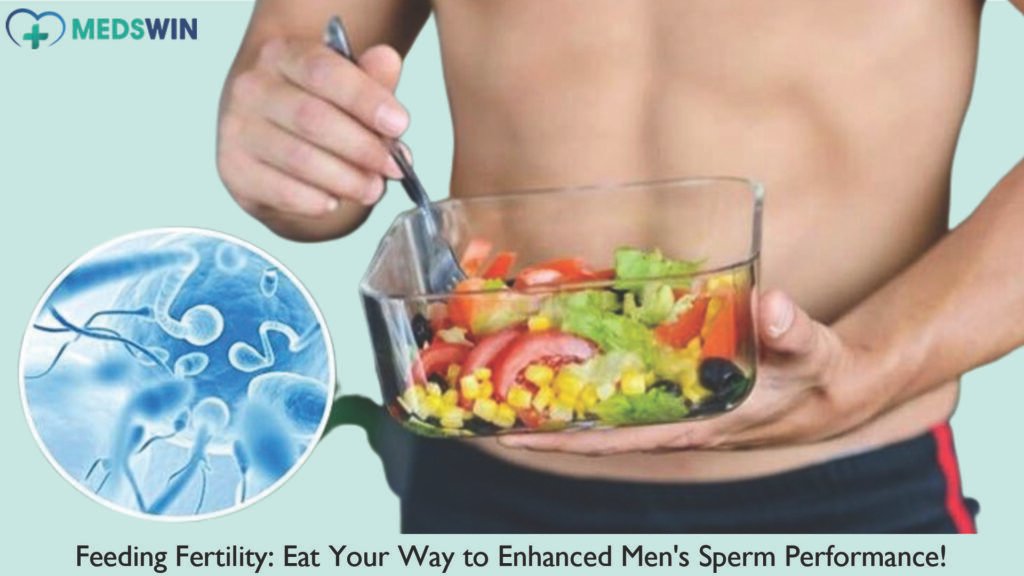Health, Erectile Dysfunction, Food
Feeding Fertility: Eat Your Way to Enhanced Men’s Sperm Performance!
Enhanced Men’s Sperm Performance
When considering matters of fertility and reproductive well-being, numerous elements come into the equation along these, nutrition plays a significant role in determining the quality and performance of men’s sperm. Whether you’re considering starting a family or simply aiming to optimize your reproductive health, understanding how your diet impacts sperm performance is essential. In this article, we’ll delve into the realm of feeding fertility and explore how you can eat your way to enhance men’s sperm performance.
Feeding Fertility: Eat Your Way to Enhanced Men’s Sperm Performance!
Feeding Fertility: Eat Your Way to Enhanced Men’s Sperm Performance! is not just a catchy phrase; it’s a concept backed by scientific evidence. Your diet can influence various aspects of sperm health, including count, motility, morphology, and overall quality. By making informed dietary choices, you can potentially boost your fertility and improve your chances of successful conception.
The Power of Nutrient-Rich Foods
To optimize sperm performance, it’s essential to consume a diet rich in nutrients that support reproductive health. Here are some key nutrients and foods to focus on:
Omega-3 Fatty Acids
Omega-3 fatty acids, commonly found in fatty fish like salmon, chia seeds, and walnuts, play a crucial role in promoting sperm motility and vitality. These healthy fats also contribute to reducing inflammation in the reproductive system.
Antioxidants
Antioxidants, such as vitamin C and selenium, protect sperm cells from oxidative stress, which can damage their DNA. Citrus fruits, berries, spinach, and nuts are excellent sources of antioxidants.
Zinc
Zinc is known to enhance sperm production and quality. Include zinc-rich foods like lean meats, whole grains, and legumes in your diet to support optimal sperm function.
Folate
Folate, or vitamin B9, is associated with improved sperm DNA integrity. Leafy greens, avocados, and fortified cereals are great sources of folate.
L-Carnitine and Coenzyme Q10
These compounds are essential for energy production in sperm cells. Lean meats, dairy, and whole grains provide L-carnitine, while Coenzyme Q10 is found in fish, poultry, and whole grains.
Dietary Habits for Enhanced Sperm Performance
It’s not just about individual nutrients; your overall dietary pattern matters too. Adopt these habits for improved reproductive health:
Balanced Diet
Prioritize a balanced diet that includes a variety of nutrient-rich foods. This ensures you’re getting a spectrum of vitamins and minerals essential for sperm health.
Hydration
Staying adequately hydrated is crucial for maintaining optimal sperm concentration. Drink plenty of water throughout the day.
Limit Processed Foods
Processed foods often contain trans fats and additives that can negatively impact sperm quality. Choose whole, natural foods whenever the opportunity arises, avoiding processed options.
Moderate Caffeine Intake
While a moderate amount of caffeine is generally fine, excessive consumption may affect fertility. Strive to restrict your daily consumption of caffeine.
Mindful Portions
Maintain a healthy weight through mindful portion control. Obesity can have adverse effects on sperm quality and reproductive hormones.
Frequently Asked Questions (FAQs)
Q: Can diet really affect sperm quality?
A: Absolutely! Your diet directly influences sperm quality and performance. Consuming nutrient-rich foods can Enhanced Men’s Sperm Performance count, motility, and overall health.
Q: Are there specific foods to avoid for better sperm health?
A: Yes, it’s advisable to limit the consumption of processed foods, sugary snacks, and excessive amounts of caffeine and alcohol. These can impact sperm quality.
Q: How soon can dietary changes impact sperm health?
A: It takes about 72 days for sperm to develop fully. Making positive dietary changes over several months can lead to noticeable improvements in sperm quality.
Q: Can supplements replace a healthy diet for better sperm health?
A: Although supplements can enhance a balanced diet, it’s more advisable to acquire essential nutrients from whole, unprocessed foods. A balanced diet offers a broader range of nutrients and benefits.
Q: Are organic foods better for sperm health?
A: Organic foods may have fewer pesticide residues, which can be beneficial for overall health. However, the impact of organic foods specifically on sperm health is not well-documented.
Q: Can weight loss improve sperm quality?
A: Yes, losing excess weight through a balanced diet and exercise can positively impact Enhanced Men’s Sperm Performance quality and reproductive hormone levels.
Conclusion
In the journey towards enhanced men’s sperm performance, the role of nutrition is paramount. By making thoughtful dietary choices and adopting healthy habits, you can potentially boost your fertility and contribute to optimal reproductive health. Remember, the impact of nutrition on sperm health is a gradual process, so consistency is key. Feed your fertility, and pave the way for a healthier reproductive future.
Here are the Most popular ED medicines:
Cenforce 100 Mg | Vidalista 40 Mg | Fildena 100 Mg



